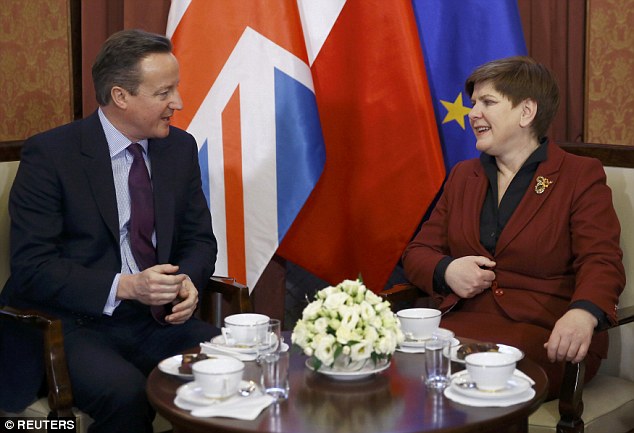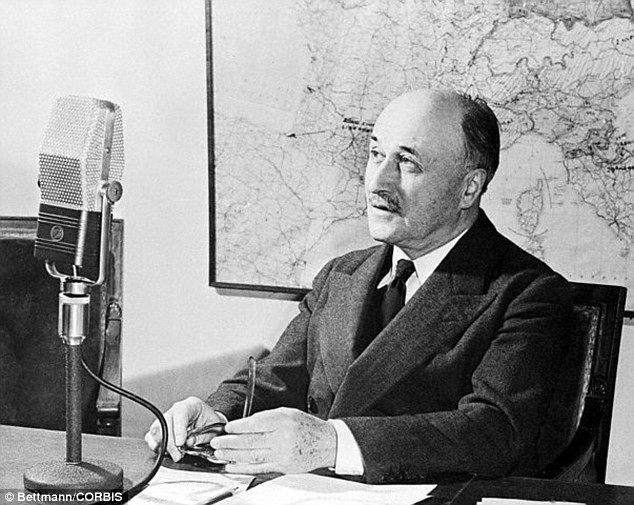It seems that the British electorate isn't happy with Mr Cameron's feeble EU renegotiation deal and could now be leaning towards voting for a Brexit as a result.
The campaign for Britain to leave the European Union was today given a massive boost after a poll gave it a nine point lead - the first since David Cameron unveiled his draft EU deal.
The record lead for the Brexit campaign suggests voters have overwhelmingly rejected the Prime Minister's plans for an emergency brake for EU migrants' access to benefits and a 'red card' for national parliaments to veto EU laws.
It deals a blow to Cameron as he kick-starts his charm offensive to persuade EU leaders to agree to the deal before a crucial Brussels summit later this month.
The first survey of public opinion since Tuesday's deal found 45 per cent of voters will opt to quit the EU, while just 36 per cent want to remain.
It is the biggest lead for Brexit since the wording of the referendum question was confirmed last summer.
EU in/out referendum: Brexit campaign surges ahead with 9-point lead in first poll since David Cameron's EU deal as the PM kick-starts his Euro charm offensive in Poland and Denmark
Record lead for Out campaign suggests voters have rejected PM's plans
But crucially, one in five voters have yet to decide which way they will vote
PM reiterates his support for staying in the EU as he arrives in Warsaw
He then jets off to Copenhagen to meet Danish PM Lars Løkke Rasmussen
By Matt Dathan, Mailonline Political Correspondent
5 February 2016 Daily Mail
The campaign for Britain to leave the European Union was today given a massive boost after a poll gave it a nine point lead - the first since David Cameron unveiled his draft EU deal.
The record lead for the Brexit campaign suggests voters have overwhelmingly rejected the Prime Minister's plans for an emergency brake for EU migrants' access to benefits and a 'red card' for national parliaments to veto EU laws.
It deals a blow to Cameron as he kick-starts his charm offensive to persuade EU leaders to agree to the deal before a crucial Brussels summit later this month.

David Cameron met Polish Prime Minister Beata Szydło, pictured right, in Warsaw this morning as he began his efforts to persuade his 27 EU counterparts to agree to his draft renegotiation to keep Britain in the EU


Polish Prime Minister Beata Szydło has been a stumbling block to Cameron's hopes of securing changes to benefit rules - such as the absurd rule which allows Polish immigrants in Britain to claim British child benefit for their children in Poland - but today expressed support for his draft deal to keep Britain in the EU
The first survey of public opinion since Tuesday's deal found 45 per cent of voters will opt to quit the EU, while just 36 per cent want to remain.
It is the biggest lead for Brexit since the wording of the referendum question was confirmed last summer.
But crucially, one in five voters have yet to decide which way they will vote. according to the YouGov survey for The Times.
This morning Cameron reiterated his support for Britain's continued membership of the EU as he arrived to meet Polish Prime Minister Beata Szydło in Warsaw.
'I think Britain is better off in a reformed European Union if we can achieve those changes and I think it is something that will be good for Britain, good for Europe and also good for Poland.
'We want to make sure that our cooperation is as close as possible in the months and years to come.'


John Whittingdale, pictured left, became the first cabinet minister to test Cameron's rules on opposing EU membership by refusing to rule out backing Brexit while David Davis, pictured right, ridiculed Mr Cameron's deal as a 'waste of time'
The Polish premier has been a stumbling block for Cameron as he sought changes to rules on EU migrants claiming benefits in Britain, expressing concern that the 800,000 poles who live in the UK will be hit.
But speaking this morning, she signalled she would support Cameron's draft deal.
Cameron's enthusiastic backing for his renegotiation deal has led to claims he is gagging his Eurosceptic ministers while racing ahead with his own campaign and the pressure from his Eurosceptic MPs has intensified over the last week.
Last night Culture Secretary John Whittingdale became the first cabinet minister to test Cameron's rules on opposing EU membership by refusing to rule out backing Brexit.
The Prime Minister has agreed to suspend the 'collective responsibility' rules and allow his ministers to publicly oppose him on the EU referendum - but only once he has finalised his negotiation and presented it to the Cabinet.
'I have a track record where I've been highly critical of the way the EU works and I have opposed measures for closer integration and it certainly needs reform.
'I hope the Prime Minister will get that agreement and then I'll look at it when he comes back with it.'
Asked if he would rule out backing Brexit, he replied: 'I wouldn't.'
His intervention came just hours after David Davis, Mr Cameron's former leadership rival, launched a bid to lead the Out campaign.
In a speech yesterday, Mr Davis ridiculed the Prime Minister's EU renegotiation deal as 'so unambitious as to be a waste of time'.
Today's poll will vindicate the Tory Eurosceptics and shows that in just one week the Out campaign has risen three points, while the In camp is down by two compared to the previous YouGov survey.
The poll, which was carried out after Cameron announced his draft deal on Tuesday, shows that once undecided voters are excluded, the out campaign is on 56 per cent and the In campaign on 44 per cent.
Cameron also came under fire from association chairmen, grassroots campaigners and Tory grandees last night after he ordered his MPs to ignore local parties' views on Europe.
Speaking in the Commons on Wednesday he told MPs they should not decide their view on the EU referendum 'because of what your constituency association might say'.
Association chairmen, grassroots campaigners and Tory grandees savaged the Prime Minister, who was accused of showing contempt for members' views.
Osman Dervish, a councillor and chairman of Romford Conservative Association in East London, said of Mr Cameron's comments:
'Every constituency chairman has to take their members on board. We should not just show contempt for what the members say. You can't just ignore them. There are concerns among the grassroots about the remarks he has made about us in the past. This reinforces them.'
Andrew Mackness, chairman of the Conservative Association in Rochester and Strood, Kent, said: 'I am annoyed the Prime Minister told MPs they should ignore their associations. They are the people who put them there, not the Prime Minister. I take exception that I receive emails and letters from the Prime Minister on Conservative Party letterhead that only presents his side.'
VOTERS ARE 'CRYING OUT' FOR AN EU TV DEBATE

The then Liberal Democrats leader and Deputy Prime Minister Nick Clegg (pro-EU) and Ukip leader Nigel Farage (anti-EU) debated the pros and cons of the EU in two TV debates ahead of the 2014 European Parliament elections which Ukip won in the UK, getting 24 seats
A leading democracy campaigner has claimed voters are 'crying out' for national TV debate on the EU referendum.
Ahead of the elections for the European Parliament in 2014 Nick Clegg and Nigel Farage went head-to-head but David Cameron and Ed Miliband refuesed to take part.
Katie Ghose, the chief executive of the Electoral Reform Society, said televised TV debates had become something voters saw as fundamental to national elections.
She said: 'We strongly support the idea of a TV debate for the EU referendum as a way to engage people in the run-up to the vote, and we would urge participants to give voters the quality of information and debate that they are crying out for.'
The campaign for Britain to leave the European Union was today given a massive boost after a poll gave it a nine point lead - the first since David Cameron unveiled his draft EU deal.
The record lead for the Brexit campaign suggests voters have overwhelmingly rejected the Prime Minister's plans for an emergency brake for EU migrants' access to benefits and a 'red card' for national parliaments to veto EU laws.
It deals a blow to Cameron as he kick-starts his charm offensive to persuade EU leaders to agree to the deal before a crucial Brussels summit later this month.
The first survey of public opinion since Tuesday's deal found 45 per cent of voters will opt to quit the EU, while just 36 per cent want to remain.
It is the biggest lead for Brexit since the wording of the referendum question was confirmed last summer.
EU in/out referendum: Brexit campaign surges ahead with 9-point lead in first poll since David Cameron's EU deal as the PM kick-starts his Euro charm offensive in Poland and Denmark
Record lead for Out campaign suggests voters have rejected PM's plans
But crucially, one in five voters have yet to decide which way they will vote
PM reiterates his support for staying in the EU as he arrives in Warsaw
He then jets off to Copenhagen to meet Danish PM Lars Løkke Rasmussen
By Matt Dathan, Mailonline Political Correspondent
5 February 2016 Daily Mail
The campaign for Britain to leave the European Union was today given a massive boost after a poll gave it a nine point lead - the first since David Cameron unveiled his draft EU deal.
The record lead for the Brexit campaign suggests voters have overwhelmingly rejected the Prime Minister's plans for an emergency brake for EU migrants' access to benefits and a 'red card' for national parliaments to veto EU laws.
It deals a blow to Cameron as he kick-starts his charm offensive to persuade EU leaders to agree to the deal before a crucial Brussels summit later this month.

David Cameron met Polish Prime Minister Beata Szydło, pictured right, in Warsaw this morning as he began his efforts to persuade his 27 EU counterparts to agree to his draft renegotiation to keep Britain in the EU


Polish Prime Minister Beata Szydło has been a stumbling block to Cameron's hopes of securing changes to benefit rules - such as the absurd rule which allows Polish immigrants in Britain to claim British child benefit for their children in Poland - but today expressed support for his draft deal to keep Britain in the EU
The first survey of public opinion since Tuesday's deal found 45 per cent of voters will opt to quit the EU, while just 36 per cent want to remain.
It is the biggest lead for Brexit since the wording of the referendum question was confirmed last summer.
But crucially, one in five voters have yet to decide which way they will vote. according to the YouGov survey for The Times.
This morning Cameron reiterated his support for Britain's continued membership of the EU as he arrived to meet Polish Prime Minister Beata Szydło in Warsaw.
'I think Britain is better off in a reformed European Union if we can achieve those changes and I think it is something that will be good for Britain, good for Europe and also good for Poland.
'We want to make sure that our cooperation is as close as possible in the months and years to come.'


John Whittingdale, pictured left, became the first cabinet minister to test Cameron's rules on opposing EU membership by refusing to rule out backing Brexit while David Davis, pictured right, ridiculed Mr Cameron's deal as a 'waste of time'
The Polish premier has been a stumbling block for Cameron as he sought changes to rules on EU migrants claiming benefits in Britain, expressing concern that the 800,000 poles who live in the UK will be hit.
But speaking this morning, she signalled she would support Cameron's draft deal.
Cameron's enthusiastic backing for his renegotiation deal has led to claims he is gagging his Eurosceptic ministers while racing ahead with his own campaign and the pressure from his Eurosceptic MPs has intensified over the last week.
Last night Culture Secretary John Whittingdale became the first cabinet minister to test Cameron's rules on opposing EU membership by refusing to rule out backing Brexit.
The Prime Minister has agreed to suspend the 'collective responsibility' rules and allow his ministers to publicly oppose him on the EU referendum - but only once he has finalised his negotiation and presented it to the Cabinet.
'I have a track record where I've been highly critical of the way the EU works and I have opposed measures for closer integration and it certainly needs reform.
'I hope the Prime Minister will get that agreement and then I'll look at it when he comes back with it.'
Asked if he would rule out backing Brexit, he replied: 'I wouldn't.'
His intervention came just hours after David Davis, Mr Cameron's former leadership rival, launched a bid to lead the Out campaign.
In a speech yesterday, Mr Davis ridiculed the Prime Minister's EU renegotiation deal as 'so unambitious as to be a waste of time'.
Today's poll will vindicate the Tory Eurosceptics and shows that in just one week the Out campaign has risen three points, while the In camp is down by two compared to the previous YouGov survey.
The poll, which was carried out after Cameron announced his draft deal on Tuesday, shows that once undecided voters are excluded, the out campaign is on 56 per cent and the In campaign on 44 per cent.
Cameron also came under fire from association chairmen, grassroots campaigners and Tory grandees last night after he ordered his MPs to ignore local parties' views on Europe.
Speaking in the Commons on Wednesday he told MPs they should not decide their view on the EU referendum 'because of what your constituency association might say'.
Association chairmen, grassroots campaigners and Tory grandees savaged the Prime Minister, who was accused of showing contempt for members' views.
Osman Dervish, a councillor and chairman of Romford Conservative Association in East London, said of Mr Cameron's comments:
'Every constituency chairman has to take their members on board. We should not just show contempt for what the members say. You can't just ignore them. There are concerns among the grassroots about the remarks he has made about us in the past. This reinforces them.'
Andrew Mackness, chairman of the Conservative Association in Rochester and Strood, Kent, said: 'I am annoyed the Prime Minister told MPs they should ignore their associations. They are the people who put them there, not the Prime Minister. I take exception that I receive emails and letters from the Prime Minister on Conservative Party letterhead that only presents his side.'
VOTERS ARE 'CRYING OUT' FOR AN EU TV DEBATE

The then Liberal Democrats leader and Deputy Prime Minister Nick Clegg (pro-EU) and Ukip leader Nigel Farage (anti-EU) debated the pros and cons of the EU in two TV debates ahead of the 2014 European Parliament elections which Ukip won in the UK, getting 24 seats
A leading democracy campaigner has claimed voters are 'crying out' for national TV debate on the EU referendum.
Ahead of the elections for the European Parliament in 2014 Nick Clegg and Nigel Farage went head-to-head but David Cameron and Ed Miliband refuesed to take part.
Katie Ghose, the chief executive of the Electoral Reform Society, said televised TV debates had become something voters saw as fundamental to national elections.
She said: 'We strongly support the idea of a TV debate for the EU referendum as a way to engage people in the run-up to the vote, and we would urge participants to give voters the quality of information and debate that they are crying out for.'
Last edited:








